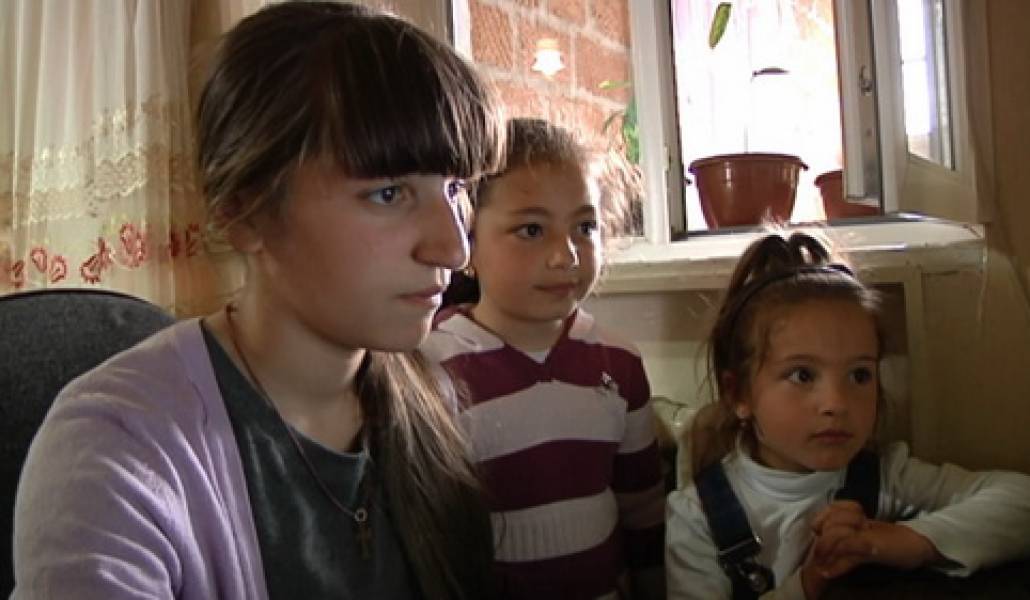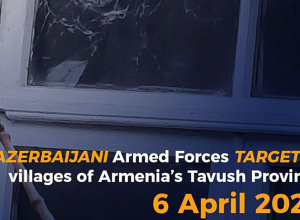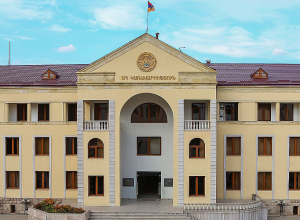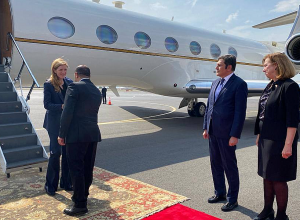How Haykush became daughter of the Tadevosyans (video)

Haykush, 14, is an aunt of the girls. The girls do not even know that Haykush isn’t a relative of theirs. Haykush was only three when the Tadevosyans brought her to their home from an orphanage. Non-biological relationship with the girls is of no importance to Haykush. “The eldest sister, Lilia, is more modest, we love her for her modesty, and the youngest sister, Larisa, is more active, I love her the most,” she says. The Tadevosyans, who live in Astghadzor community of Gegharkunik marz (province), have thought about adopting a child all their life. Though they have two sons, they have always dreamt of a daughter. The father of the family has done everything for Haykush not to need anything like his other children.  “There has been no difference between the sons and Haykush. The difference is that one of them is a girl, a child from an orphanage, while others are boys, they are different in that. I have never let her worry, they have been equal. When money was necessary for some needs, my daughter always had it,” says Vazgen Tadevosyan, Haykush’s non-biological father. The girl is also talking about the attitude of the Tadevosyans towards her: “I love my parents very much, as they kept me and brought me up, they did their best when I was a child. I saw their suffering, how they brought me up. I didn’t lack anything at school.” Haykush is one of the best dancers of the community’s dance group. The certificate can prove it. “First that dance was very difficult for me, then I was trying over and over, and now it is my favorite dance.” Haykush is not only the joy of the family, but also the right hand of her mother. She always helps her mother in the kitchen and sets a table. “There are dishes, which I cannot cook, and in order not to leave all the household chores to mother, she cooks and in the meantime I set a table, we eat and then I clear the table and wash the dishes.” The girl considers herself to be lucky, but her everyday joy is not conditioned by her own person. “I would be happy to see people around me treat each other kindly without insulting each other, because people will speak to you the same way as you speak to them.”
“There has been no difference between the sons and Haykush. The difference is that one of them is a girl, a child from an orphanage, while others are boys, they are different in that. I have never let her worry, they have been equal. When money was necessary for some needs, my daughter always had it,” says Vazgen Tadevosyan, Haykush’s non-biological father. The girl is also talking about the attitude of the Tadevosyans towards her: “I love my parents very much, as they kept me and brought me up, they did their best when I was a child. I saw their suffering, how they brought me up. I didn’t lack anything at school.” Haykush is one of the best dancers of the community’s dance group. The certificate can prove it. “First that dance was very difficult for me, then I was trying over and over, and now it is my favorite dance.” Haykush is not only the joy of the family, but also the right hand of her mother. She always helps her mother in the kitchen and sets a table. “There are dishes, which I cannot cook, and in order not to leave all the household chores to mother, she cooks and in the meantime I set a table, we eat and then I clear the table and wash the dishes.” The girl considers herself to be lucky, but her everyday joy is not conditioned by her own person. “I would be happy to see people around me treat each other kindly without insulting each other, because people will speak to you the same way as you speak to them.”  Vazgen Tadevosyan is even ready to keep 10 children, if their housing conditions allowed. He says from the experience of their family; the institution of foster family is the best and can fully replace an orphanage. “There must be no orphanages, that concept must be eliminated in Armenia, a child always needs parents. Everybody can take and keep a child, saving the child’s life in that way. A child must grow up in a family, understanding the concepts mother, parent, sister and brother,” says Vazgen Tadevosyan. Still 14 foster families
Vazgen Tadevosyan is even ready to keep 10 children, if their housing conditions allowed. He says from the experience of their family; the institution of foster family is the best and can fully replace an orphanage. “There must be no orphanages, that concept must be eliminated in Armenia, a child always needs parents. Everybody can take and keep a child, saving the child’s life in that way. A child must grow up in a family, understanding the concepts mother, parent, sister and brother,” says Vazgen Tadevosyan. Still 14 foster families  The institution of foster family has operated in Armenia since 2008. The Tadevosyan family is just one of 14 foster families in Armenia. The Ministry of Labour and Social Affairs implements this project together with the United Nations Children's Fund (UNICEF). “Work should be carried out to find potential foster families and find out children, who can be placed in foster care. I hope that starting from 2017 it will be possible to find foster families for the children,” says Hayk Khemchyan, Head of the Armenian branch of the organization. “Our policy is directed towards the reduction in number of children in the institutions and prevention of entrance to those institutions. We mainly aim at returning the child to the biological family, but if it is impossible, we try to find a foster family for the child or a family, which is ready to adopt the child,” says Karine Khachatryan, a chief specialist of Family, Women and Children Affairs Department of the Staff of Armenia's Labour and Social Affairs.
The institution of foster family has operated in Armenia since 2008. The Tadevosyan family is just one of 14 foster families in Armenia. The Ministry of Labour and Social Affairs implements this project together with the United Nations Children's Fund (UNICEF). “Work should be carried out to find potential foster families and find out children, who can be placed in foster care. I hope that starting from 2017 it will be possible to find foster families for the children,” says Hayk Khemchyan, Head of the Armenian branch of the organization. “Our policy is directed towards the reduction in number of children in the institutions and prevention of entrance to those institutions. We mainly aim at returning the child to the biological family, but if it is impossible, we try to find a foster family for the child or a family, which is ready to adopt the child,” says Karine Khachatryan, a chief specialist of Family, Women and Children Affairs Department of the Staff of Armenia's Labour and Social Affairs.  The state is still not going to close down the six orphanages, but it handles the issue of reduction in number of children at those orphanages. In the near future Vanadzor orphanage and Nubarashen boarding school will change their role. “We aim to turn boarding schools and orphanages into day care centres. Here the children, who don’t have families, will receive care in up to 6 months’ period until their fate is decided. In the near future we will have only one orphanage in Armenia,” says Karine Khachatryan.
The state is still not going to close down the six orphanages, but it handles the issue of reduction in number of children at those orphanages. In the near future Vanadzor orphanage and Nubarashen boarding school will change their role. “We aim to turn boarding schools and orphanages into day care centres. Here the children, who don’t have families, will receive care in up to 6 months’ period until their fate is decided. In the near future we will have only one orphanage in Armenia,” says Karine Khachatryan.  Director of Zatik orphanage Ashot Mnatsakanyan is not against replacing the institution of orphanage with foster families, though he has reservations in this regard. “Child’s entry to a family, where there are already children, causes a difficult situation. Maybe the parents themselves cannot notice that they make their child happy, caress their child, making difference between the children. If we choose a foster family, then they should not have their own children.” Ashot Mnatsakanyan, who has 23 years of experience in working with children, thinks that an alternative to orphanages are centres like Zatik. “These centers are the best institutions resolving that problem, as people with spiritual consciousness work here, who carry out relevant work with children and children are under appropriate supervision.” Waiting for families…
Director of Zatik orphanage Ashot Mnatsakanyan is not against replacing the institution of orphanage with foster families, though he has reservations in this regard. “Child’s entry to a family, where there are already children, causes a difficult situation. Maybe the parents themselves cannot notice that they make their child happy, caress their child, making difference between the children. If we choose a foster family, then they should not have their own children.” Ashot Mnatsakanyan, who has 23 years of experience in working with children, thinks that an alternative to orphanages are centres like Zatik. “These centers are the best institutions resolving that problem, as people with spiritual consciousness work here, who carry out relevant work with children and children are under appropriate supervision.” Waiting for families…  Three years ago, the former Zatik orphanage was reorganized into a child support centre. The centre works around the clock taking care of children who are sent to biological or foster families in six months. In some cases, children’s stay at the centre can be extended. At the centre, you will also find children living away from home. One of them is Gayane. “I feel protected inside [the centre], here I am surrounded by people who love me very much and take care of me. Outside, there are people who love me, too, but I do not find the same care as I find here, in Zatik. For me, life is better here than there,” she says. As the most senior member of the permanent group of the centre, Gayane, 16, shares her perceptions of life to the younger ones. “I try to explain [to them] that it is not a good thing to envy one another, that we live under the same roof and we should not envy one another for we are sisters and brothers,” she says.
Three years ago, the former Zatik orphanage was reorganized into a child support centre. The centre works around the clock taking care of children who are sent to biological or foster families in six months. In some cases, children’s stay at the centre can be extended. At the centre, you will also find children living away from home. One of them is Gayane. “I feel protected inside [the centre], here I am surrounded by people who love me very much and take care of me. Outside, there are people who love me, too, but I do not find the same care as I find here, in Zatik. For me, life is better here than there,” she says. As the most senior member of the permanent group of the centre, Gayane, 16, shares her perceptions of life to the younger ones. “I try to explain [to them] that it is not a good thing to envy one another, that we live under the same roof and we should not envy one another for we are sisters and brothers,” she says.  Gayane always thinks about living with a family, and although she does not attend school, she does not give up on her dream of becoming a teacher and educating children. She already knows what she will do after she enters a classroom as a teacher… “First of all I would urge and explain to them that it is important to become good and useful people in life. I would tell them that envy and evil will do nothing good to them. I would encourage my boys to become good for our nation, to be fit for our army. I would also advise the girls to be a little understanding and reasonable when they grow up,” Gayane says. Varazdat, 14, also spends most of his time at the centre. He has good computer skills and competences. “I remember that we had a computer at home. I began to play computer since 4, I played a lot and I know all programmes. I can take apart a computer, disassemble its parts and put them back together again.
Gayane always thinks about living with a family, and although she does not attend school, she does not give up on her dream of becoming a teacher and educating children. She already knows what she will do after she enters a classroom as a teacher… “First of all I would urge and explain to them that it is important to become good and useful people in life. I would tell them that envy and evil will do nothing good to them. I would encourage my boys to become good for our nation, to be fit for our army. I would also advise the girls to be a little understanding and reasonable when they grow up,” Gayane says. Varazdat, 14, also spends most of his time at the centre. He has good computer skills and competences. “I remember that we had a computer at home. I began to play computer since 4, I played a lot and I know all programmes. I can take apart a computer, disassemble its parts and put them back together again.  Varazdat is eager to become more skillful in computer programming and wants to become a computer programmer or a computer repair technician. “First of all, I want to finish school and then take a computer science course,” he says. Confidence in the future is determined by the faith in his abilities but when it comes to dreams and their realization Varazdat has much to say here. When asked about his dreams, Varazdat said, “I have none.” In reply to our next question whether he had never thought of his dreams, he said, “No, I have not…” At present, the state does not provide funds for realizing the goals of children living in orphanages or other similar institutions. However, it spends huge amounts of money on orphanages. For example, AMD 2 122 526 000 was allocated from the state budget for keeping 749 children in 6 orphanages in 2015. In other words, AMD 2 856 000 was allocated for each child.
Varazdat is eager to become more skillful in computer programming and wants to become a computer programmer or a computer repair technician. “First of all, I want to finish school and then take a computer science course,” he says. Confidence in the future is determined by the faith in his abilities but when it comes to dreams and their realization Varazdat has much to say here. When asked about his dreams, Varazdat said, “I have none.” In reply to our next question whether he had never thought of his dreams, he said, “No, I have not…” At present, the state does not provide funds for realizing the goals of children living in orphanages or other similar institutions. However, it spends huge amounts of money on orphanages. For example, AMD 2 122 526 000 was allocated from the state budget for keeping 749 children in 6 orphanages in 2015. In other words, AMD 2 856 000 was allocated for each child.  As of January 1, 2016, there were over 660 children in six state-run orphanages in Armenia and only 10 percent of them were one- or two-sided parentless. Most parents cited poverty as the main reason for their inability to bring them up. Comparative calculations show that the annual funding allocations to orphanages will be enough to cover annual household expenses of 826 families, each consisting of four members. Alternatively, the same amount can be paid to 1222 foster families who provide nutrition, environment and care for children from orphanages. Foster care is far less expensive than keeping an orphanage open. The state allocates each foster family AMD 147 000 per month. This programme is implemented within the frames of the Media for Informed Civic Engagement project, which was realized with the support of the people of America through the United States Agency for International Development (USAID). Responsibility for the contents belongs only to the authors and do not necessarily reflect the views of the USAID or the US Government.
As of January 1, 2016, there were over 660 children in six state-run orphanages in Armenia and only 10 percent of them were one- or two-sided parentless. Most parents cited poverty as the main reason for their inability to bring them up. Comparative calculations show that the annual funding allocations to orphanages will be enough to cover annual household expenses of 826 families, each consisting of four members. Alternatively, the same amount can be paid to 1222 foster families who provide nutrition, environment and care for children from orphanages. Foster care is far less expensive than keeping an orphanage open. The state allocates each foster family AMD 147 000 per month. This programme is implemented within the frames of the Media for Informed Civic Engagement project, which was realized with the support of the people of America through the United States Agency for International Development (USAID). Responsibility for the contents belongs only to the authors and do not necessarily reflect the views of the USAID or the US Government.



